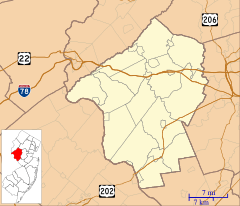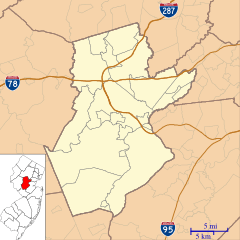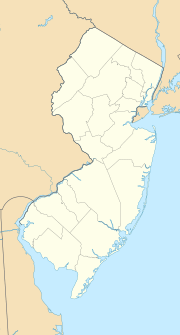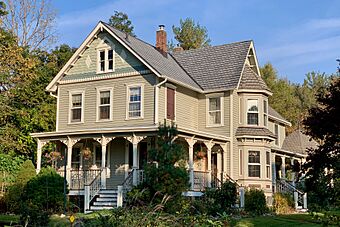Pottersville, New Jersey facts for kids
Quick facts for kids
Pottersville, New Jersey
|
|
|---|---|
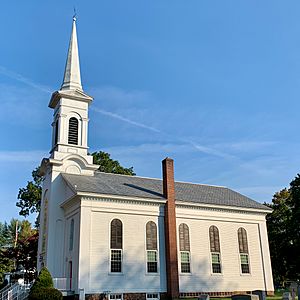
Pottersville Reformed Church
|
|
| Country | |
| State | |
| County | Hunterdon and Somerset |
| Township | Bedminster and Tewksbury |
| Area | |
| • Total | 0.92 sq mi (2.38 km2) |
| • Land | 0.91 sq mi (2.36 km2) |
| • Water | 0.01 sq mi (0.02 km2) |
| Elevation | 213 ft (65 m) |
| Population
(2020)
|
|
| • Total | 467 |
| • Density | 512.06/sq mi (197.61/km2) |
| Time zone | UTC−05:00 (Eastern (EST)) |
| • Summer (DST) | UTC−04:00 (Eastern (EDT)) |
| FIPS code | 34-60750 |
| GNIS feature ID | 879465 |
Pottersville is a small community in New Jersey, USA. It is split between two counties: Somerset and Hunterdon. Even though it's a small place, it's officially recognized as a census-designated place (CDP). This means the government collects information about the people living there.
The area uses the United States Postal Service ZIP Code 07979. In 2020, about 467 people lived in Pottersville. A large part of the village was added to the National Register of Historic Places in 1990. This means it's a special place with important history.
Contents
Pottersville Population Facts
As of the 2020 United States census, the population of Pottersville was 467 people.
| Historical population | |||
|---|---|---|---|
| Census | Pop. | %± | |
| 2020 | 467 | — | |
| U.S. Decennial Census 2020 |
|||
Schools in Pottersville
Pottersville was once home to the Purnell School. This was a private high school for girls, started in 1963. However, in February 2021, the school announced it would close.
Later that same year, the Pingry School bought the large 82-acre campus. Pingry School plans to use this campus as an extra location. It will add to their existing schools in Basking Ridge and Short Hills.
Pottersville's Past
Pottersville was first known by different names, like Lamington and Potters Mills. Mills were built here as early as 1756 by William Willet.
Early Mills and the Revolution
One old mill still stands today near County Route 512. It was first used to make woolen goods. Later, it became a grist mill, which grinds grain into flour. The very first grist mill was built along the Lamington River (also called Black River). That original mill is no longer there, but a special plaque marks its spot.
William Willet, the mill owner, kept a record of his sales. He sold supplies to the Continental Army during the American Revolutionary War. His main job became helping the army. However, he was paid in Continental currency. This money became worthless around 1780. This caused him to lose all his money. He had to sell both his mills to Serrin Potter in 1783. This is how the community got its current name, Pottersville!
Peach Farming and the Railroad
In 1887, peach farming was a big deal in the area. Over 200,000 baskets of peaches were sent from Pottersville and nearby New Germantown (now Oldwick). They were moved by wagons to towns like Chester and Whitehouse.
Because peach farming was so successful, the Rockaway Valley Railroad built a train track to Pottersville in 1888.
Black River Falls Amusement Park
Pottersville also had a beautiful spot called Black River Falls. The railroad started running special trips for people to visit the falls. The land around the falls became a picnic area and even an amusement park! It had a merry-go-round, a dance hall, and a snack stand. Some visitors came all the way from Jersey City, New Jersey. They often stayed at the Pottersville Hotel.
Sadly, the peach crops eventually failed. This led to the end of the Rockaway Railroad. One person who lived in the town remembered the park being open as late as 1920.
Pottersville Historic District
The Pottersville Village Historic District is a special area that protects the village's history. It was added to the National Register of Historic Places on September 18, 1990. This was done because of its importance in industry, business, architecture, and how the village grew from 1750 to 1924.
The district includes 44 buildings that help tell the story of the past. It also has 4 historic sites and 2 historic structures.
Famous People from Pottersville
Some notable people have lived in or are connected to Pottersville:
- Harriet Adams (1893–1982): She was an author who wrote about 200 books. This includes almost 50 books in the popular Nancy Drew series.
Images for kids
-
Lamington River by Lower Mill site
 | Emma Amos |
 | Edward Mitchell Bannister |
 | Larry D. Alexander |
 | Ernie Barnes |


